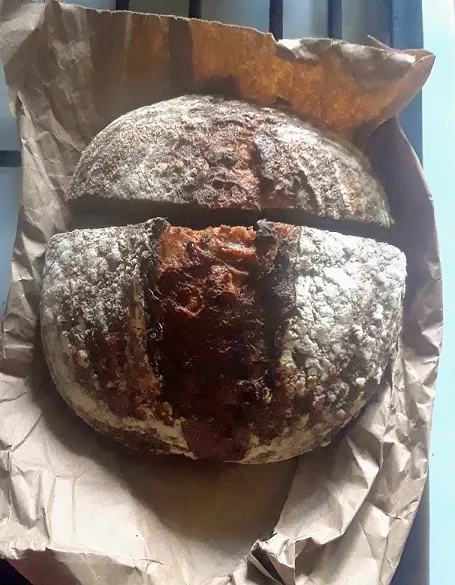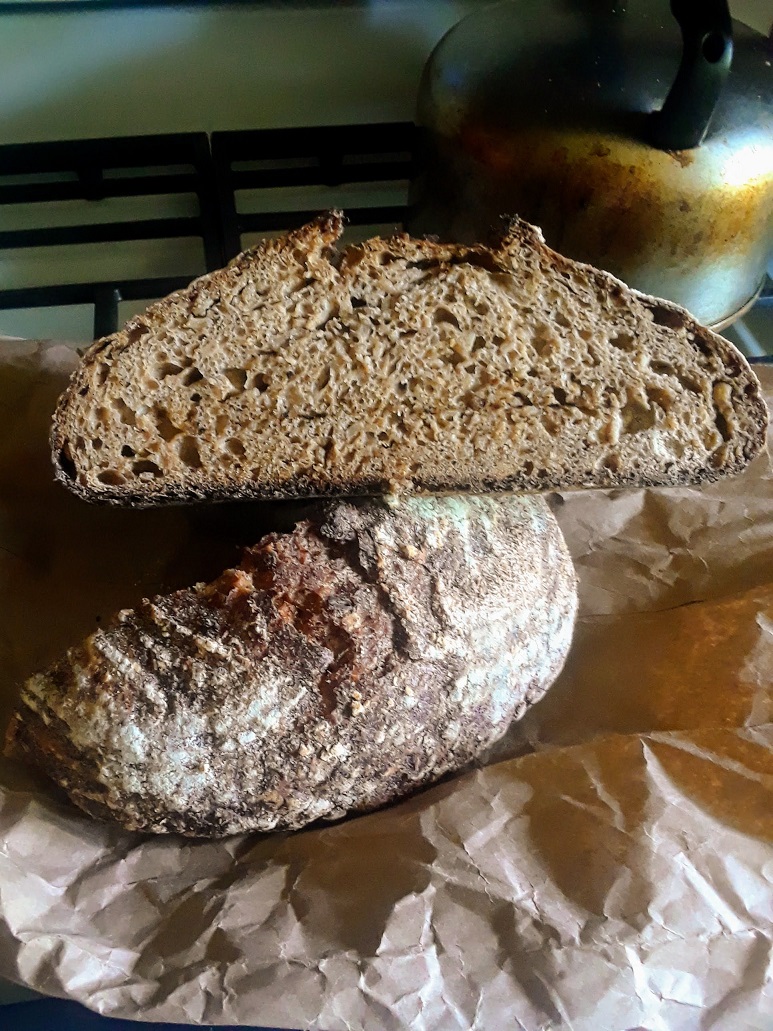
I've been baking bread for a number of years now and experimenting with whole wheat and various other grains for about 2 years, mostly in a fairly haphazard, now and then manner. After purchasing Tartine No. 3, I've been inspired to double down on experimentation with different grains, so it seems like a good time to also get a little more methodical about documenting loaves.
I'm new to the porridge loaf concept. All the previous loaves I've done involved adding a percent of non-wheat flour. My first go-round with a corn meal porridge was not great. I don't think I cooked it long enough and when I went to incorporate it into the dough it was clumpy and rough, tearing the dough and making little corn meal lumps. Barley was much nicer. I forgot to crack the barley as the method calls for (soaked in whey at room temperature for a day prior, hoping to add some fermentation), so I just cooked the porridge longer, adding a pinch of salt and cane syrup. Water evaporated some and burnt on the bottom, but I scraped that in as I cooked, and that probably richened the flavor actually. Barley porridge is really tasty by itself.
Loaf specs.:
Total Flour- 500g
Central Milling High Gluten Bread Four- 300g (60%)
Dayspring Farm Hard Red Whole Wheat- 150g (30%)
Sparrowbush Renan Whole Wheat- 50g (10%)
Wheat germ 75g (15%)
Water 375g (75%)
Leaven ~55g (11%)
**********************
Salt ~3tsp
**********************
Barley Porridge ~250g (50%)
Process:
1. Measure out leaven and water, whisk with fork until roughly combined. Add in flours, stir with fork until fully combined and dampened. Set outside (maybe 75-80 deg.) to autolyse for ~1.5 hrs
2. Pinch in salt
3. Stretch and fold every 30 min. for 3hrs. After 1.5 hrs. I stretch out the dough into a wide rectangle and spread the porridge evenly across the surface, then did a set of folds to incorporate. Prior to adding the porridge, the dough was developing a nice elasticity/strength, was slightly wet but very manageable. Once the porridge was added it became very wet and sticky and hard to manage, though the dough strength was still present. After later folds, the porridge became more consistently incorporated, less tearing of the dough occurred, but it was still very sticky.
4. leave overnight to continue bulk fermentation overnight ~8 hrs. @ ~60ish degrees
5. scraped out of bowl, pre-shaped, then roughly shaped into a batard, though given the wetness and stickiness of the dough this was not very successful as I was not able to fold/roll it on itself as I'm used to doing. Dumped it in the proofing basket regardless, hoping that the small basket relative to the amount of dough might force it to conform despite my loose shaping.
6. Refrigerated for ~ 10 hrs. (then put in the freezer for last 30 min. as I wanted it as firm as possible when I turned it out of the basket because I was fearin' a sloppy mess)
7. Heat over & round dutch oven to 500 deg.
8. Turned out onto board, scored lengthwise, perpendicular full length
9. Bake: covered @ 500 20 min
uncovered @ 500 10 min
uncovered @ 450 30 min
turned off oven and left bread in with residual heat another 10-20 min.
Result:
Coming out of the oven, the loaf clearly sagged a decent bit, but it didn't totally loose shape. With the long bake, it had a nice dark and crispy crust and felt very airy to the touch. Once I cut into it the next morning, it was less visibly airy than I had hoped, but upon tasting it, I think it is actually really nicely airy. By the morning it had lost its nice crispy crust due to this cursed Georgia humidity (but I like my bread toasted so it's ok). Cutting into the middle it seemed about fully cooked, perhaps just a tad under cooked at the very center.
Visually, this looks like a very mediocre to poor loaf, but taste-wise it might be my favorite ever! When I make this again I want to try decreasing the porridge percentage and seeing if that gives me a dough that I can handle better and thus shape tighter. I think this might address some of the spreading out (though so degree is probably inevitable with such a wet dough). Also a smaller score might discourage spreading?

---------------
Loaf #2
Pretty similar recipe and approach as #1
No wheat germ, whole wheat flour was all Dayspring Catawba Red. Porridge was lessened to about 30%.
Due to warmer temperature and fitting it into a modified schedule, the timing was a little different. Autolyse for 1 hour. Stretch and fold over ~3 hrs, incorporating porridge after 1.5 hrs. Shortened the remaining bulk fermentation to 4-5 hrs. since room temp was probably in the 80s. In retrospect, I think it should have gone longer as the crumb wasn't super airy even with the lower portion of porridge. The dough was much easier to manage and shape. Flavor was good, but it was still nothing like loaf #1.
-----------------
- CrustyJohn's Blog
- Log in or register to post comments